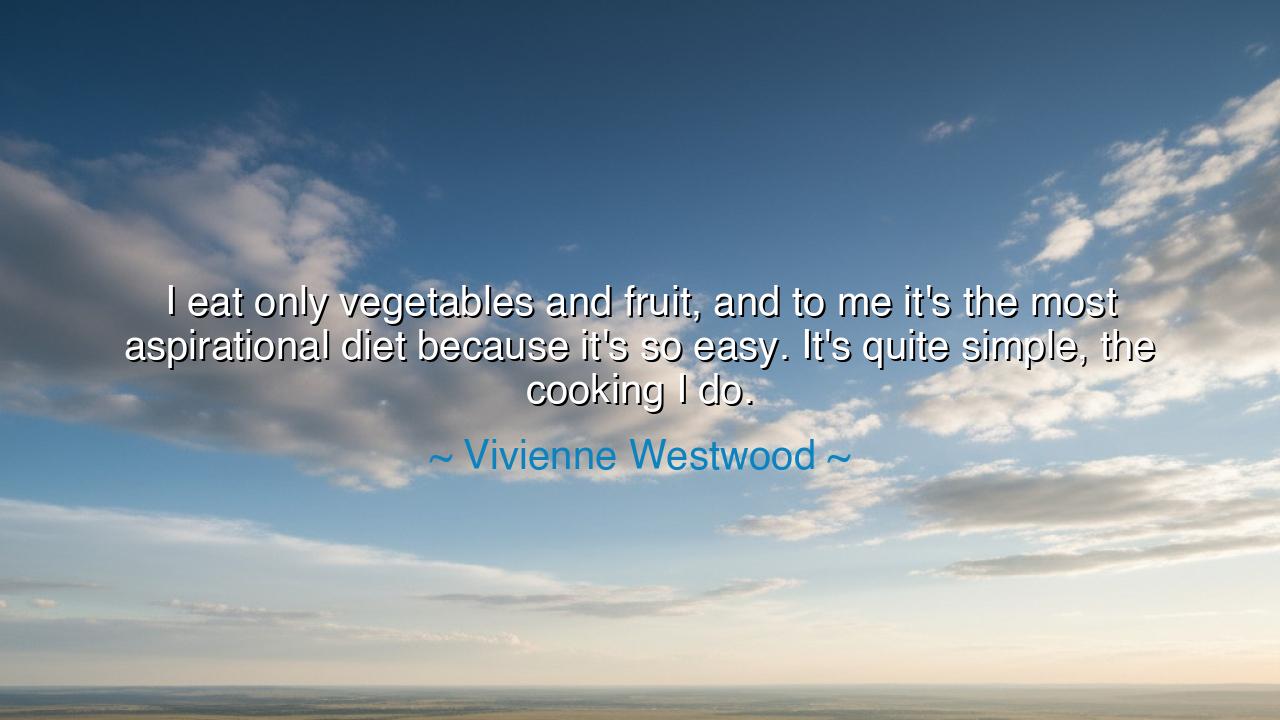
I eat only vegetables and fruit, and to me it's the most
I eat only vegetables and fruit, and to me it's the most aspirational diet because it's so easy. It's quite simple, the cooking I do.






In the quiet wisdom of Vivienne Westwood, a profound truth is revealed about the simplicity and power of the foods we choose to nourish our bodies. Her words, "I eat only vegetables and fruit, and to me it's the most aspirational diet because it's so easy. It's quite simple, the cooking I do," speak not just of food, but of a philosophy of living—one rooted in simplicity, intentionality, and the deep connection between what we consume and who we become. The aspirational diet, she refers to, is not the path of indulgence or excess, but the path of balance and nourishment. It is a path that leads toward both physical health and spiritual clarity, where the simplest foods—fruits and vegetables—become the building blocks of a noble life.
The ancient Greeks, whose culture valued wisdom and moderation above all, would have understood Westwood’s sentiments well. They spoke often of simplicity, not as a lack of wealth or indulgence, but as a reflection of the true nature of the soul. Socrates, the revered philosopher, lived not in excess, but in the simplicity of thought and practice, believing that a life well-lived was one rooted in balance. He ate not for pleasure, but for nourishment, choosing food that sustained the body and cleared the mind. His philosophy teaches us that to eat simply is to honor the body as a vessel for the spirit, and in doing so, we become stronger, more aware, and more aligned with the natural rhythms of the world.
There is a deep wisdom in Westwood’s choice of vegetables and fruit as her guiding sustenance. In choosing these foods, she aligns herself with the ancient traditions that have sustained countless civilizations throughout the ages. The Egyptians, for example, who revered the gifts of the earth, believed that the gods provided food in abundance, yet they chose wisely—nourishing themselves with simple grains, fruits, and vegetables that grew from the earth. These foods, as the ancients knew, held the power to strengthen the body and clear the mind, granting vitality without the burden of excess. To live by such a diet was to live in harmony with nature, to honor the balance of life itself.
In choosing to eat in this simple way, Westwood reveals a profound understanding of what it means to live aspirationally—not in the sense of pursuing luxury or indulgence, but in striving for a life of purpose and health. The simple act of eating becomes a way to cultivate wisdom, clarity, and strength. In the hustle and excess of the modern world, it is easy to become lost in the noise of indulgence. Yet Westwood’s approach offers a different kind of wisdom—the wisdom of restraint, of choosing foods that heal, that nourish, and that give the body the energy it needs without weighing it down with toxins and excess.
Consider, for a moment, the example of Leonidas, the king of Sparta, whose warriors were renowned for their strength and discipline. Spartan society, like many ancient cultures, prized simplicity and self-discipline above all. Their diet, simple and austere, was rooted in the foods that sustained them: grains, vegetables, fruits, and a diet free of excess. It was not indulgence that made the Spartans great, but their dedication to self-mastery—a mastery that was reflected in their food choices. In this way, Westwood’s diet mirrors the ancient understanding that the greatest strength comes not from indulgence, but from restraint and a commitment to what is natural and nourishing.
The true lesson here is simple, yet profound: simplicity in food is the path to true strength, clarity, and vitality. In choosing to eat foods that nourish the body without complication, we honor both the body and the spirit. Just as the ancients understood that food was not just for pleasure, but for well-being, so too must we understand that the foods we choose shape the lives we lead. Westwood’s words serve as a guide for all who seek balance—those who strive to live authentically, with purpose, and with a deep respect for the natural world.
So let this be your guide: seek nourishment in its purest form. Choose foods that are simple, whole, and unprocessed—the fruits and vegetables that grow from the earth, the grains that sustain the body with their simplicity. Eat not to indulge, but to nourish and to strengthen. In doing so, you align yourself with the wisdom of the ancients, the strength of the earth, and the clarity of a life well-lived. May you find in this simplicity the true path to health, wisdom, and balance.






AAdministratorAdministrator
Welcome, honored guests. Please leave a comment, we will respond soon